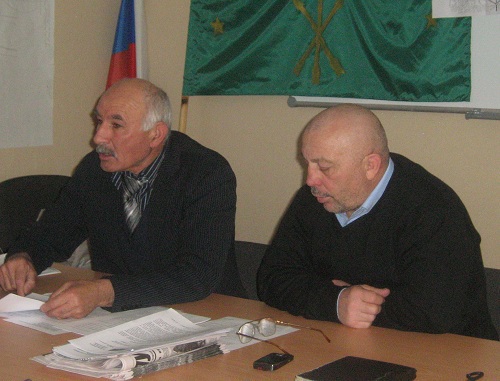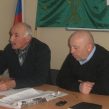
Moscow Faces Unpleasant Dilemma in Dealing with the Syrian Circassian Issue
Publication: Eurasia Daily Monitor Volume: 9 Issue: 17
By:

On January 22, the Circassian activist organization Adyge Khase-Circassian Parliament met in Adygea’s capital Maikop and resolved to hold a conference on the repatriation of Circassians from Syria. The conference is expected to take place in Adygea on February 11. The activists also called on the Circassians in Kabardino-Balkaria to hold a conference to discuss the issue. In December 2011 and earlier this month, dozens of Circassian families living in Syria appealed to Russian President Dmitry Medvedev to allow them to relocate to the North Caucasus (https://adygeia.kavkaz-uzel.ru/articles/199730, January 23).
As the situation in Syria shows few signs of a peaceful transformation, the Circassians residing there are trying to find a way out by returning to their ancestral homeland. Most of the estimated 150,000 Circassians in Syria are descendants of those who were expelled by Russians from their homeland in the North Caucasus to the Ottoman Empire in the second half of the nineteenth century. While Circassians traditionally were loyal to the Syrian government, the latest troubles in the country have reportedly made many of them rethink their allegiances. Circassian activists in the North Caucasus appealed in May 2011 to Moscow to help their kin in Syria, but Moscow cursorily replied that the situation did not require its involvement (See “Syrian Regime Loses Support from Circassian Community,” Sufian Zhemukhov, EDM, January 10).
One of the ticklish sides of the problem is that as an ally of Syrian President Bashar Assad’s regime, Moscow does not want to cast the situation in that country as a civil war or humanitarian catastrophe. By relocating hundreds of Circassians from Syria, Moscow would indirectly illuminate the disastrous situation in that Middle Eastern country and make it harder for Russian officials to defend Assad against criticism by Western and Arab countries.
On January 13, Circassian civil activists organized a conference on the Syrian Circassians. Conference participants said 411 Syrian Circassians had officially appealed to the Russian president for assistance. This number could potentially grow to thousands, although it is not expected that all of the Syrian Circassians will relocate to the North Caucasus. Adygea is considered to be the best place for the repatriates, given that it has experience with taking in other Circassian refugees and a low population density. The conference participants reportedly displayed various attitudes toward Russia, recalling, on the one hand, the major atrocities perpetrated against the Circassians by the Russian Empire in the nineteenth century, while, on the other hand, realizing the Circassians will require Russian government assistance and attempting to reassure that Circassian repatriates will not cause any trouble for Russia in the North Caucasus (https://www.elot.ru/main/index.php?option=com_content&task=view&id=2695&Itemid=1, January 17).
Aside from international considerations, the Russian government has domestic concerns about repatriating Circassians from Syria. First of all, the Circassians diaspora is quite large and it is unclear how many of them will want to resettle in the North Caucasus. If all those seeking to resettle are allowed in, it might significantly alter the ethnic map of the North Caucasus, which Moscow has been trying so hard to Russify. If only a few are allowed in and most would-be Circassian repatriates are kept out, that could antagonize the North Caucasus Circassians even more. An implicit consideration, which official Moscow does not declare openly, is that ethnically non-Russian immigrants who are just as indigenous to the country as ethnic Russians are somewhat less welcome in the Russian Federation.
In a rare gesture of support for the Syrian Circassians, the head of Kabardino-Balkaria, Arsen Kanokov, made a special statement. “It is necessary to help our compatriots abroad to come back to Russia,” he said. “We readily receive foreigners, while shying away from a discussion about our own citizens. Regarding the Syrian Circassians, their return to Russia does not bring any threats. I met representatives of the Circassian diasporas in Syria, Jordan, Israel, Turkey and witnessed their pro-Russian sentiment; they are very loyal people” (https://www.regnum.ru/news/kavkaz/kab-balk/1488420.html, January 16).
Potentially, Russia could score points portraying itself as a defender of Circassians and partly alleviate the opposition of Circassian activists to the 2014 Winter Olympics in Sochi. By providing safe passage for Circassian repatriates from Syria to the North Caucasus, Moscow may win over a few Circassian hearts and minds, especially those of the locals who oppose the Olympics on the grounds that it will be held on the site of the nineteenth century Circassian genocide. At this moment, however, Moscow’s decision-makers appear to be swayed by the negative factors associated with the return of the Syrian Circassians to the North Caucasus.
On January 17, an Abkhaz government delegation paid a surprise visit to Syria to check out the situation with Abkhaz and Circassian population there. Ethnic Abkhaz are still in a precarious demographic situation in the breakaway Georgian territory of Abkhazia despite the mass expulsion of ethnic Georgians during the 1992-1993 Georgian-Abkhaz war. So the Abkhaz would supposedly be interested in attracting Abkhaz immigrants. However, probably because the Abkhaz government is under the watchful eye of the Kremlin, the Abkhaz delegation in Syria met mostly ethnic Abkhaz and Circassians who were not seeking to return to their ancestral homeland. Only six Abkhaz families are reportedly seeking to relocate to Abkhazia were identified. Some unofficial sources communicated via Internet websites that the Syrian government did not allow the Abkhaz delegations to meet people wanting to leave Syria. The Abkhaz delegation allegedly had a very short visit and quickly left the country to avoid crowds of ethnic Abkhaz and Circassians pleading for help to get out of Syria (https://www.aheku.org/page-id-2815.html, January 23).
The Syrian crisis presents Moscow with a no-win situation that the risk-averse Russian government is unwilling to try to resolve, probably hoping it will dissipate gradually by itself. This approach, however, will only further widen the gap between the Circassians in the North Caucasus and Moscow. While Moscow can conveniently try to ignore this issue as long as it wants, the real danger might emerge is if Tbilisi sees this as an opportunity and tries to take advantage of the situation by offering to help relocate Circassians from Syria to Georgia, a distinct possibility that some Circassian activists have privately raised with the Georgians in an effort to seek their support for the sufferings of their compatriots in Syria.




